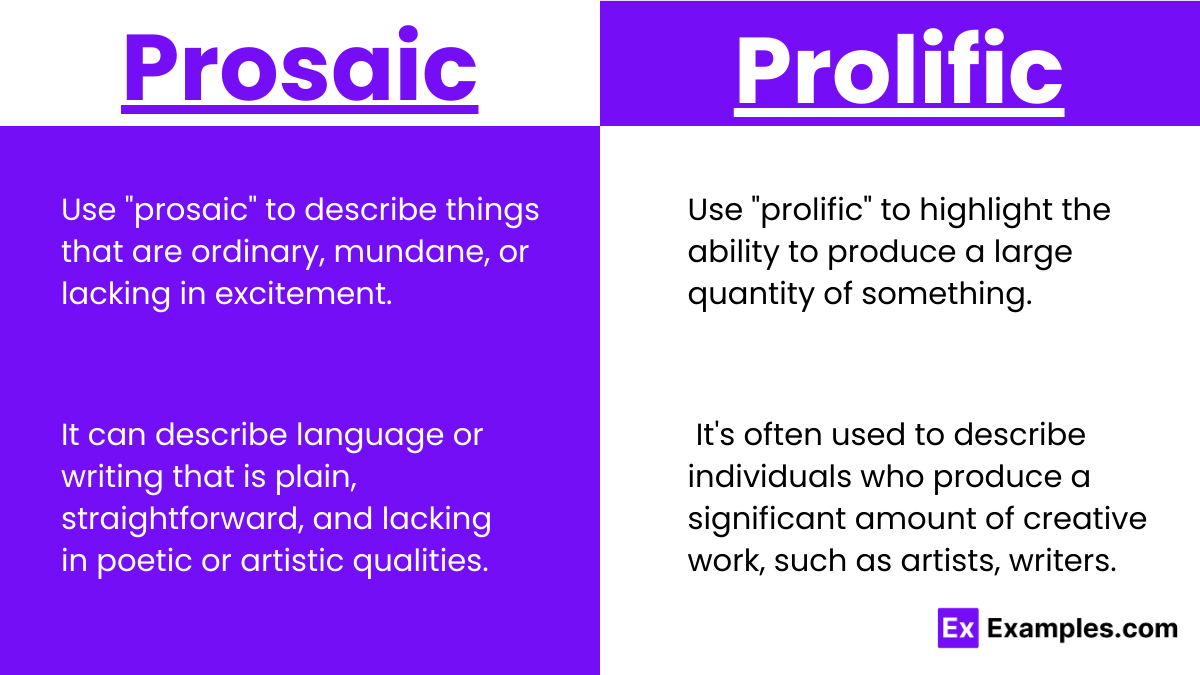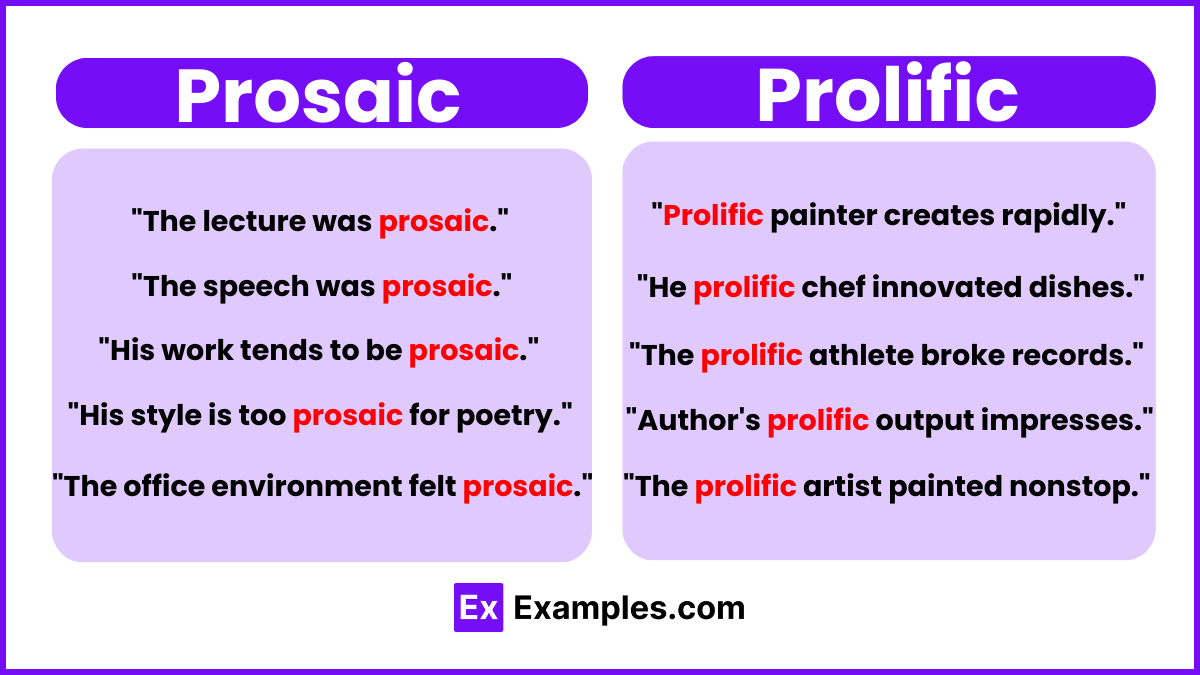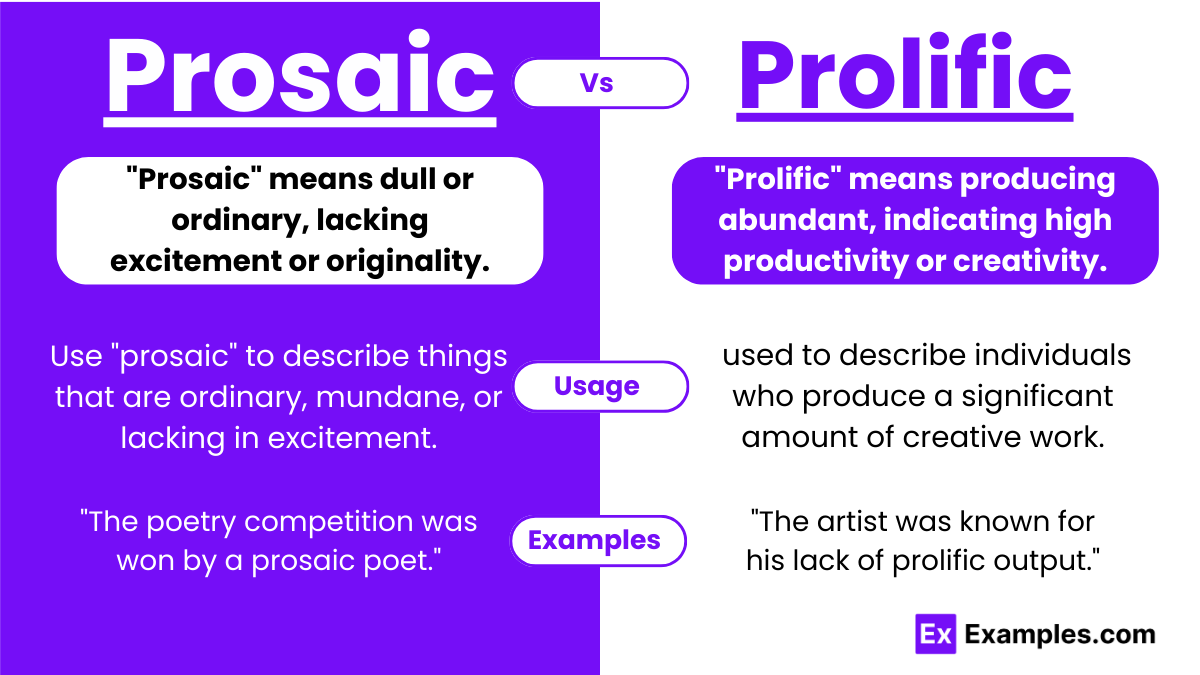Prosaic vs Prolific – Meanings, Differences, Usage, Examples
While “Prosaic” and “Prolific” may sound similar, they carry distinct meanings. “Prosaic” refers to something mundane, ordinary, or lacking excitement, often associated with dullness or monotony. On the contrary, “Prolific” denotes great productivity, creativity, or abundance in output. Despite their phonetic resemblance, these terms cannot be used interchangeably. For example, a writer may produce prolific works, but a mundane task might be described as prosaic.
Prosaic and Prolific – Meanings
- Prosaic: It implies something ordinary, commonplace, or lacking in excitement. It often describes situations, tasks, or works that are dull, mundane, or unremarkable. It suggests a lack of imagination, creativity, or inspiration.
- Prolific: It denotes great productivity, creativity, or abundance in output. It refers to individuals or entities that produce a large quantity of work, ideas, or creations. It conveys a sense of accomplishment, creativity, or fertility.
Summary
How to Pronounce Prosaic and Prolific
Prosaic: Pronounced as /prəˈzeɪɪk/.
Prolific: Pronounced as /prəˈlɪfɪk/.
Differences Between Prosaic and Prolific
| Aspect | Prosaic | Prolific |
|---|---|---|
| Definition | Mundane, lacking excitement | Productive, abundant in output |
| Nature | Ordinary, commonplace | Creative, abundant |
| Usage | Describing dullness or monotony | Highlighting productivity or abundance |
| Application | Referring to mundane tasks or situations | Describing productive individuals or entities |
| Emphasis | Lack of excitement or inspiration | Great productivity or creativity |
How To Remember The Differences Between Prosaic and Prolific
Prosaic: It refers to something ordinary or commonplace, like prose in writing. To remember this, think of the word “prosaic” sounding like “prose,” which is ordinary writing.
Prolific: It means producing abundant works or offspring. To remember this, focus on the letter “l” in “prolific,” which can stand for “lots” or “lots of” to remind you of abundance.
When To Use Prosaic and Prolific

Usage of Prosaic
- Ordinary and Mundane: Use “prosaic” to describe things that are ordinary, mundane, or lacking in excitement.
- Lack of Originality: It often implies a lack of creativity or originality, suggesting something is commonplace or predictable.
- Everyday Language: It can describe language or writing that is plain, straightforward, and lacking in poetic or artistic qualities.
- Routine Tasks or Activities: “Prosaic” can be applied to routine tasks, activities, or situations that are unremarkable or uninteresting.
- Commonplace Objects: It’s suitable for describing objects or items that are typical, ordinary, or not particularly special.
Usage of Prolific
- Abundance and Productivity: Use “prolific” to highlight abundance, productivity, or the ability to produce a large quantity of something.
- Creative Output: It’s often used to describe individuals who produce a significant amount of creative work, such as artists, writers, or musicians.
- Highly Fertile or Productive: “Prolific” can also describe organisms or systems that produce offspring, results, or outputs in large numbers.
- Consistent Achievements: It’s used to denote someone or something consistently achieving or creating at a high level.
- Variety and Range: “Prolific” can imply not only quantity but also a wide range or variety of output, indicating versatility and creativity.
How To use Prosaic and Prolific
- To use “prosaic” correctly, identify situations where something is mundane, ordinary, or lacking in excitement. “Prosaic” is used when describing tasks, situations, or works that are dull, unremarkable, or lacking inspiration.
- To use “prolific” appropriately, consider contexts where there is a significant output of work, ideas, or creations. “Prolific” indicates great productivity, creativity, or abundance. It emphasizes the quantity or quality of output produced.
Prosaic and Prolific – Examples

Prosaic Examples:
- The novel’s was rather prosaic, following predictable plot twists.
- His wardrobe consisted of prosaic outfits, lacking any sense of style or flair.
- The office cubicle felt prosaic, with its plain walls and standard-issue furniture.
- Her speech was prosaic, filled with cliches and lacking originality.
- The movie’s dialogue was prosaic, failing to engage the audience.
Prolific Examples:
- The artist was prolific, creating a masterpiece every month.
- The scientist was prolific in publishing research papers, with several groundbreaking discoveries credited to their name.
- Mozart was a prolific composer, producing symphonies at an astonishing rate.
- The writer was prolific, churning out novels faster than readers could keep up.
- The inventor was prolific, patenting numerous inventions throughout their career.
Synonyms for Prosaic and Prolific
| Prosaic | Prolific |
|---|---|
| Mundane | Productive |
| Dull | Creative |
| Ordinary | Fertile |
| Commonplace | Abundant |
| Uninspired | Fruitful |
Exercise
- The __________ writer churned out three novels in just one year.
- After years of __________ routine, she longed for some excitement in her life.
- The artist’s __________ paintings captured the attention of art enthusiasts worldwide.
- Despite his __________ appearance, he possessed a deeply creative mind.
- The garden was a testament to her __________ green thumb, with flowers blooming in every corner.
Answers
- Prolific
- Prosaic
- Prolific
- Prosaic
- Prolific
FAQ’S
Can a person be prosaic?
Yes, a person’s writing or demeanor can be prosaic, indicating plainness or lacking excitement. It often describes ordinary or mundane qualities.
Is prolific a compliment?
Yes, “prolific” is generally a compliment, indicating someone produces abundant work or results. It suggests productivity, creativity, and high achievement.
Is “prolific” always positive?
Not always. While “prolific” often conveys productivity and abundance positively, it depends on context. It can be neutral or negative in certain situations.
Can “prolific” be used outside of creative contexts?
Absolutely. “Prolific” can describe productivity in various fields beyond creativity, such as science, business, or any area with abundant output.


